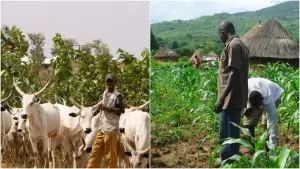The Bichi local government council in Kano State has announced a complete ban on farming activities within designated grazing reserves and cattle routes, in a decisive move to prevent deadly clashes between farmers and herders across the region.
Acting Chairman of Bichi local government council, Alhaji Abubakar Sule Babangida Ɗanzabuwa, made this announcement on Tuesday, emphasizing that the administration is taking proactive measures to ensure zero casualties from farmer-herder conflicts during this rainy season.
According to a statement signed by Tasiʼu Jibo Dawanau, the Information Officer for Bichi local government, these recurring conflicts have been described as "a disturbing and avoidable challenge" that requires immediate intervention.
The Supervisory Councilor for Land and Survey, Samaʼila Abdu Dutsen Ɗorawa, who represented the acting chairman, stated that the primary objective of this policy is to foster peaceful coexistence among all parties across the eleven wards under Bichi's jurisdiction.
"The local administration will take disciplinary measures against defaulters," Ɗorawa warned, while urging traditional leaders to ensure compliance with these new regulations within their domains.
Malam Sunusi Alhaji Adamu Damargu, a farmer from the area, voiced support for the initiative, advising relevant authorities to implement preventive measures that would minimize these conflicts and promote socioeconomic development.
Damargu called on fellow farmers to respect the ban by avoiding cultivation in designated grazing reserves and cattle routes. Similarly, he urged herders to refrain from grazing their livestock on farmlands to prevent potential conflicts.
This development comes as Nigeria continues to grapple with deadly farmer-herder conflicts across multiple states, which have claimed thousands of lives and displaced numerous communities in recent years.
The Bichi local government's approach represents one of several attempts by authorities at different levels to address the persistent challenge of resource competition between farming and herding communities, particularly during the rainy season when agricultural activities intensify.













